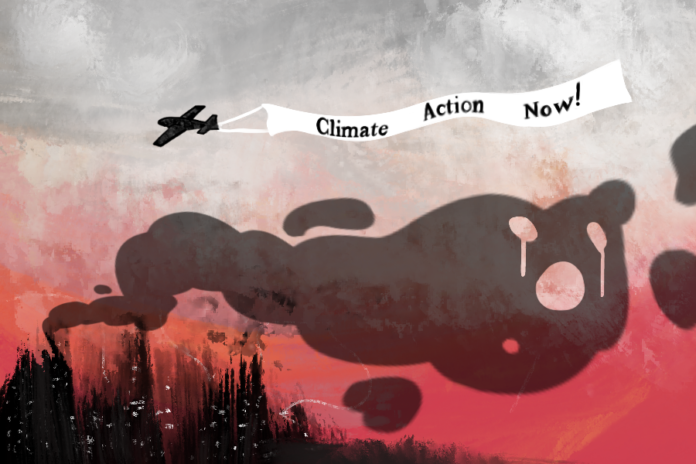Preventative action needs to be taken now to secure a safer future
By MAYA KORNYEYEVA — mkornyeyeva@ucdavis.edu
This July, our planet once again hit record-breaking global temperatures: with almost every consecutive day becoming the hottest day ever recorded. Florida water temperatures hit above 101 degrees Fahrenheit, drought and fire season were jointly declared in the state of Washington and massive storms ravaged Italy, leaving many parts of the country flooded. More frightening news — if that is even possible — predicts the collapse of the mid-Atlantic ocean current system in the mid-21st century, with the potential to significantly raise sea levels and induce drought and extreme weather events.
For the past few years, it feels as though the world has slowly begun spinning out of control. These recent climate-related headlines are among the thousands of news stories and scientific studies that have proved over and over that pollution and industrialization are contributing to the frequent destabilized weather patterns recorded as of late.
Yet, it is with the deepest frustration that I log onto my computer each morning to read how climate legislation is being stalled in both governments and private companies — with no clear commitments made to curb global warming in these next few crucial years.
After the 2022 Climate Summit (COP27) in Sharm el-Sheikh, Egypt, progress was made to provide funding to vulnerable countries in order to minimize the losses and damages caused by climate change. However, solutions to the actual causes of these “losses and damages” — the causes of climate change itself — were vague and undefined, leaving me doubtful that countries will be able to stick to a concrete plan of action in terms of carbon emission cuts and transitioning to renewable energy. As global conversations negotiating climate action continue every other year, it seems as though humanity is ever so slowly inching toward a climate-induced demise: taking one step forward, and two steps back.
From an economic perspective, this unwillingness to make significant commitments in regard to climate change is understandable, seeing as our society is powered by energy derived from fossil fuels. If approved, authorizing large carbon emission cuts would force companies to opt for another energy source or face profit and production losses.
I strongly believe that in the climate emergency that we are facing today, time is running out too fast for governments and corporations to continue turning a blind eye in exchange for short-term financial stability. With less than a decade to prevent irreversible climate change, both individuals and organizations need to be focusing their time, energy and resources on taking the necessary steps to secure a safer future for everyone.
An important thing to keep in mind is that while the effects of global warming may feel far away to those who are unaffected by them, millions of people are struggling to survive around the world due to severe weather conditions that they did not contribute to. Countries like Chad, Somalia and Syria top the list of areas that will be most affected by global warming, according to the vulnerability criteria discussed during COP27.
By not pursuing adequate steps to curb the destruction the current state of climate change is bringing, the world is contributing to the creation of an even greater separation between those who are harmed and those who are able to afford some protection. In short, those that have the infrastructure and money to withstand dangerous weather events and those that do not — coincidentally the individuals with the most power often turn out to be the ones that allowed carbon dioxide emissions to continue in the first place.
My grim predictions of the future aside, the most important thing to take away is that the time to act is now. Whether it is using your voice to advocate for climate action, using your vote to pass the necessary legislation or taking personal responsibility to limit your own carbon footprint, any action will be a step closer in the right direction. Failure to do so only empowers the growing apathy that currently exists among the global population.
Written by: Maya Kornyeyeva — mkornyeyeva@ucdavis.edu
Disclaimer: The views and opinions expressed by individual columnists belong to the columnists alone and do not necessarily indicate the views and opinions held by The California Aggie.










